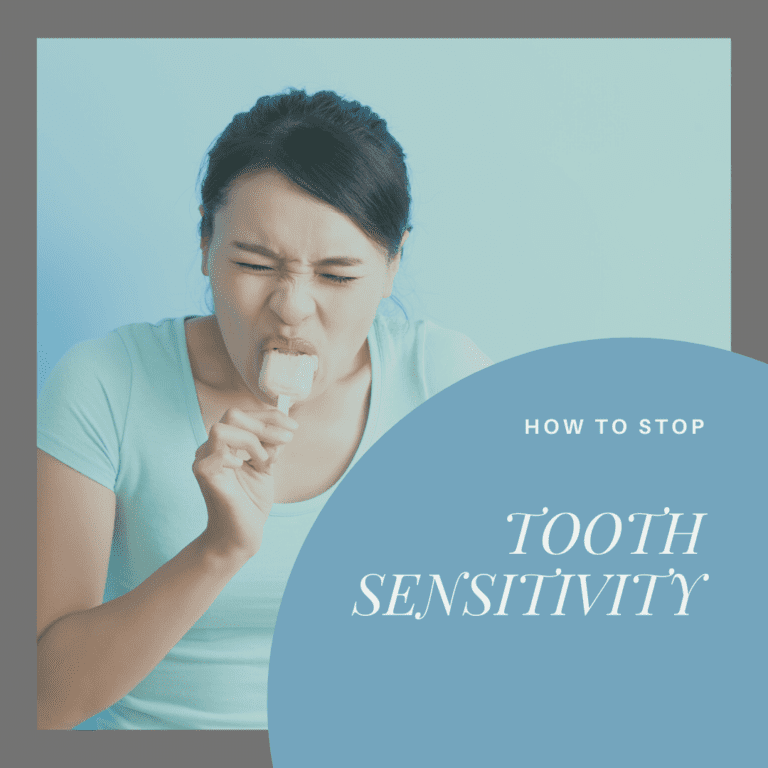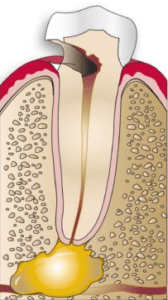How to Stop Tooth Sensitivity

According to the American Academy of General Dentistry about 40 million Americans are affected by tooth sensitivity. Are you one of these 40 million Americans with sensitive teeth who finds themselves avoiding things that are hot, cold, or sweet? Is the experience of eating an ice cream cone or sipping a cup of hot tea plagued by a nagging pain deep in your tooth? If so, then you are probably trying to find a way to stop tooth sensitivity so you can go back to enjoying your favorite foods and beverages.
Unfortunately, stopping tooth sensitivity is not always the easiest task. This is because in order to stop tooth sensitivity, you will first need to determine what is causing it. Therefore, the process of stopping sensitivity is often one of trial and error. However, this does not mean that you will be forever cursed with sensitive teeth, rather it simply means that you may need to be patient when trying to determine the cause. To make things easier, here are few common causes of tooth sensitivity, as well as methods used to stop or decrease sensitivity:

Dental Cavities
A dental cavity forms when bacteria start to erode the surface of the tooth, known as the enamel. Healthy enamel is the strongest material in the body and serves as the protective outer layer of the tooth. When it becomes eroded by decay-causing bacteria, however, tiny holes form and compromise its ability to protect the inside of the tooth. This is because the tiny holes allow stimuli to enter the inside of the tooth by passing through the porous dentin into the pulp chamber where the tooth nerve is. When the stimuli reaches the tooth’s nerve, it causes a painful reaction known as tooth sensitivity.
Some cavities are accompanied by other symptoms, which makes them easier to self-diagnose. Nevertheless, it is important to visit your dentist’s office for immediate treatment if you suspect a cavity. Otherwise the cavity will continue to progress, as will your symptoms. To restore a tooth with decay, a composite filling is generally placed. Hower inlays, onlays, and crowns may also be utilized.
Worn Enamel
A similar phenomenon can occur when the tooth’s enamel has become excessively worn. Two common causes of enamel erosion include grinding and clenching your teeth, or brushing too hard or with a brush that is too hard.
Luckily, it is somewhat easy to fix tooth sensitivity caused by these issues. For starters, if you grind or clench your teeth at night, ask your dentist about a night guard that you can wear to protect your teeth. Additionally, you will want to get a toothbrush with small, flexible, and soft bristles and modify your brushing technique so you are not pressing too hard on the teeth. You may also be able to use special toothpaste that reduces sensitivity.
Gum Recession
Your gums are responsible for supporting your teeth and they also protect the roots of your teeth. However, they can sometimes pull away from the teeth in a process known as gum recession. When this happens, the tooth roots become exposed to external stimuli. This is problematic because your tooth roots only have a thin layer of enamel since they are normally concealed under the gums. This means it is more likely that external stimuli can enter your tooth, causing irritation to the nerve.
One common cause of gum recession is brushing too hard. To fix this, adjust your brushing technique to be lighter and try to avoid brushing over your gums. Another common cause of gum recession is gum disease. Mild gum disease is known as gingivitis and can generally be reversed with treatment. Advanced gum disease is known as periodontitis and cannot be reversed, only managed with treatment. Treating gum disease can either reverse gum recession or prevent the problem from getting worse.
As you can see, there are multiple things that can cause tooth sensitivity, as well as a variety of things that can stop tooth sensitivity. With that being said, the best method for stopping tooth sensitivity is to visit your local dental office for a dental exam. Your dentist can help you identify potential problems that may be causing or increasing your tooth sensitivity. Ultimately, identifying these problems is the first concrete step to stop tooth sensitivity.






Recent Comments